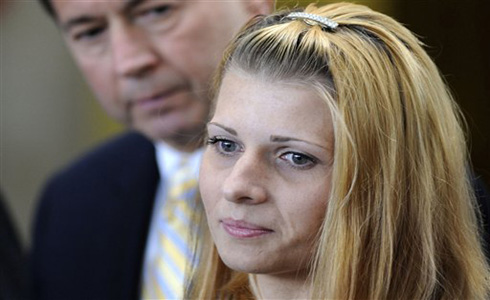 Chicago police adhere to a code of silence protecting fellow officers, a federal jury ruled Tuesday in a lawsuit filed by a female bartender whose videotaped beating by a drunken off-duty officer went viral online.
Chicago police adhere to a code of silence protecting fellow officers, a federal jury ruled Tuesday in a lawsuit filed by a female bartender whose videotaped beating by a drunken off-duty officer went viral online.
The civil trial in federal court in Chicago was the first of its kind to focus almost wholly on the question of whether there is such an ingrained code — with most of the 2½ weeks of testimony devoted to that question.
Jurors awarded $850,000 in damages to the bartender, Karolina Obrycka, who was beaten in February 2007 by Anthony Abbate, who was off-duty and admittedly drunk at the time. Surveillance video showed the hulking Abbate pushing Obrycka to the ground behind the bar at Jesse’s Shortstop Inn, then repeatedly punching and kicking her.
The video, which became a major embarrassment for Chicago police, shined a spotlight on allegations of abuse by the city’s officers. Amid accusations that police dithered in the weeks after the beating, then-Superintendent Phil Cline retired and the department vowed to clean up its image.
Abbate was convicted of aggravated battery in 2009, and sentenced to probation.
At the civil trial, Obrycka asked jurors to hold Abbate and the city liable for damages to compensate her for any pain or distress she suffered. And the core issue they had to decide was not whether Abbate beat her, but whether the police culture emboldened him and led him to act with impunity in attacking her.
“I’m still in shock,” Obrycka said outside the courtroom after the jury’s decision, adding that she hopes she can move on with her life now.
Her attorney, Terry Ekl, heralded the verdict as a landmark, precedent-setting decision.
“We proved the code of silence at every level of the Chicago Police Department,” from the first officers who responded to the beating to then-Chief Phil Cline, Ekl said after the verdict, adding that the jury’s award is more than twice the $400,000 he offered to settle the case for before trial. He noted the ultimate cost to the city will be far higher once he and his team collect their attorney’s fees.
Ekl said the onus was now on Mayor Rahm Emanuel to end the culture of protection and silence.
“The question now becomes, what are they going to do about it?” he said. “If there’s going to be change, it has to come from the mayor’s office.”
After the verdict, Emanuel’s spokeswoman, Sarah Hamilton, said in a statement that the mayor is confident that the superintendent he selected, Garry McCarthy, and his leadership team “would not approve of, let alone participate in a code of silence.”
At the same time, the city’s law department issued a statement that the city strongly disagreed with the verdict and all but promised an appeal.
“We believe Mr. Abbate alone should be held accountable for his actions,” said Roderick Drew in a prepared statement, adding that the city plans to “challenge the verdict through post-trial motions in the trial court and, if necessary, on appeal.”
During the civil trial, Obrycka’s attorneys alleged that police sought to downplay and cover up the beating, in part out of an ingrained but shadowy culture among police of protecting their own. They said that culture created an environment that led to the beating.
City attorneys countered by telling jurors there was no evidence that such a secret code existed. The fact that Abbate was eventually charged and convicted, they said, proved that the system worked.
But some police officials who testified contradicted each other, which Obrycka’s attorney said proved their point about alleged cover-ups.
Debra Kirby, who headed the department’s internal affairs division at the time, testified that she recommended during a phone call three days after the beating to a Cook County prosecutors that Abbate be charged with a serious felony.
But Joseph Stehlik, who was an internal affairs detective under Kirby’s command, said he was next to his boss at the time of the call. Stehlik testified Kirby recommended the lesser charge.
Then the prosecutor in question, Tom Bilyk, told jurors the call never happened and that he never talked with Kirby about charges.
Because Abbate was off-duty during the beating, Obrycka’s attorneys needed to persuade jurors that the silence code exists, that it was sanctioned by the city and that it led to the beating and an attempted cover-up.
Abbate was on the witness stand for two days and asked by Obrycka’s attorney about phone records showing he made dozens of calls to fellow officers in the hours after the beating. He said he was so drunk before the attack that he couldn’t remember calling anyone or what he might have said, though he insisted he “didn’t tell anyone to do anything regarding the incident.”
Abbate’s attorney said he wasn’t surprised by the verdict, saying the video was too hard to overcome even though, he said, it provides no evidence of a code of silence.
“No matter what occurred, that video in terms of my client is the most damning thing,” said Michael Malatesta.